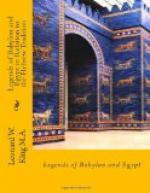For (. . .) . . . the gods a Nin-igi-azag,(2) the god Ea, . . . (. . .); sat with them, Ziusudu standing at its side And he repeated their word to heard (. . .): the house of reeds: “At the wall on my left side take “Reed-hut, reed-hut! Wall, thy stand and (. . .), wall! At the wall I will speak a word O reed-hut, hear! O wall, to thee (. . .). understand! O my devout one . . . (. . .), Thou man of Shuruppak, son of Ubar-Tutu, By our hand(?) a flood(3) . . . Pull down thy house, build a (. . .) will be (sent). ship, To destroy the seed of mankind Leave thy possessions, take (. . .) heed for thy life, Is the decision, the word of the Abandon thy property, and save assembly(4) (of the gods) thy life. The commands of Anu (and) And bring living seed of every En(lil . . .) kind into the ship. Its kingdom, its rule (. . .) As for the ship, which thou shalt build, To his (. . .)” Of which the measurements shall be carefully measured, (. . .) Its breadth and length shall correspond. (. . .) In the deep shalt thou immerse it.”
(1) Col. IV, ll.
1 ff. are there compared with Gilg. Epic,
XI, ll. 19-31.
(2) Nin-igi-azag, “The
Lord of Clear Vision”, a title borne
by Enki, or Ea, as God
of Wisdom.
(3) The Sumerian term amaru, here used for the flood and rendered as “rain-storm” by Dr. Poebel, is explained in a later syllabary as the equivalent of the Semitic-Babylonian word abubu (cf. Meissner, S.A.I., No. 8909), the term employed for the flood both in the early Semitic version of the Atrakhasis story dated in Ammizaduga’s reign and in the Gilgamesh Epic. The word abubu is often conventionally rendered “deluge”, but should be more accurately translated “flood”. It is true that the tempests of the Sumerian Version probably imply rain; and in the Gilgamesh Epic heavy rain in the evening begins the flood and is followed at dawn by a thunderstorm and hurricane. But in itself the term abubu implies flood, which could take place through a rise of the rivers unaccompanied by heavy local rain. The annual rainfall in Babylonia to-day is on an average only about 8 in., and there have been years in succession when the total rainfall has not exceeded 4 in.; and yet the abubu is not a thing of the past.
(4) The word here rendered “assembly” is the Semitic loan- word buhrum, in Babylonian puhrum, the term employed for the “assembly” of the gods both in the Babylonian Creation Series and in the Gilgamesh Epic. Its employment in the Sumerian Version, in place of its Sumerian equivalent ukkin, is an interesting example of Semitic




